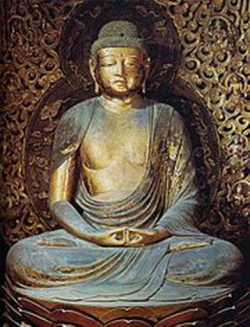Buddha-carita
Buddhacharita
仏所行讃 (Skt; Jpn Busshogyo-san )
See; Praising the Buddha's Deeds.
Buddhacharita ("Acts of the Buddha"; Buddhacaritam, Devanagari बुद्धचरितम्) is an epic poem in the Sanskrit mahakavya style on the life of Gautama Buddha by Aśvaghoṣa, composed in the 1st century CE . Of the poem's 28 cantos, the first 14 are extant in Sanskrit complete (cantos 15 to 28 are in incomplete form).
In 420, Dharmarakṣa made a Chinese translation, and in the 7th or 8th century, a very accurate Tibetan version was made.
In the 9th decade of the 20th century Mahant Ramchandra Das Shastri from Jabalpur (M.P.) had tried to complete the epic by translating into Sanskrit on the basis of Hindi translation by Suryanarayan Chaudhari. He completed the work using only ‘Anustup’ meter. It
was published from ‘Chaukhamba Vidyabhavan’Varanasi. Although he has completed it, yet the translation does not represent the original because of the use of a short meter. Mahant Ram Chandra Das did not consider the use of meter in original. So the translation became brief and many poetic effects remained unexpressed. Pandit Bhavanath Jha, the Publication and Research Officer, Mahavir Mandir, Patna,
Bihar (India) has restored the doomed portion of the Buddhacarita(canto 15 to 28). The present Poetic – Translation/restoration is the verbatim to the Tibetan-English text given by Johnston and supposed to be much close to the original Sanskrit text. The present translator has also completed the broken portion in the English translation done by Johnston borrowing the concerned expressions from the
Chinese text to maintain fluency of the poetry in the way of Indian tradition of the poetics. Therefore it can be mentioned as the restoration of the doomed text of the Buddhacharitam. It will give the original taste, rhythm and musical effect to readers and devotees of Lord Buddha as it has been produced in the original rhythm and language.
